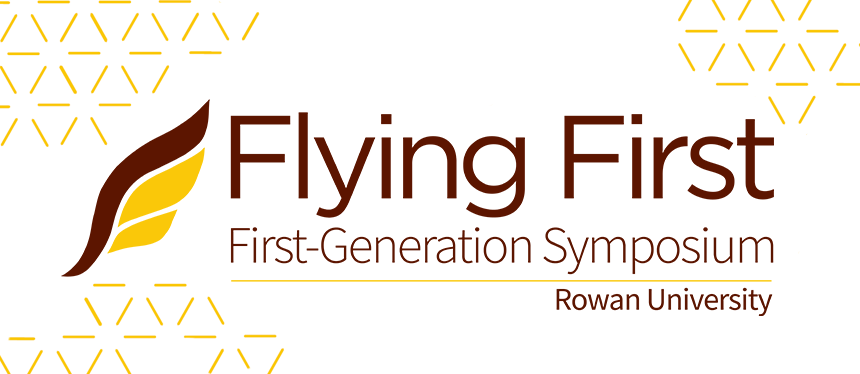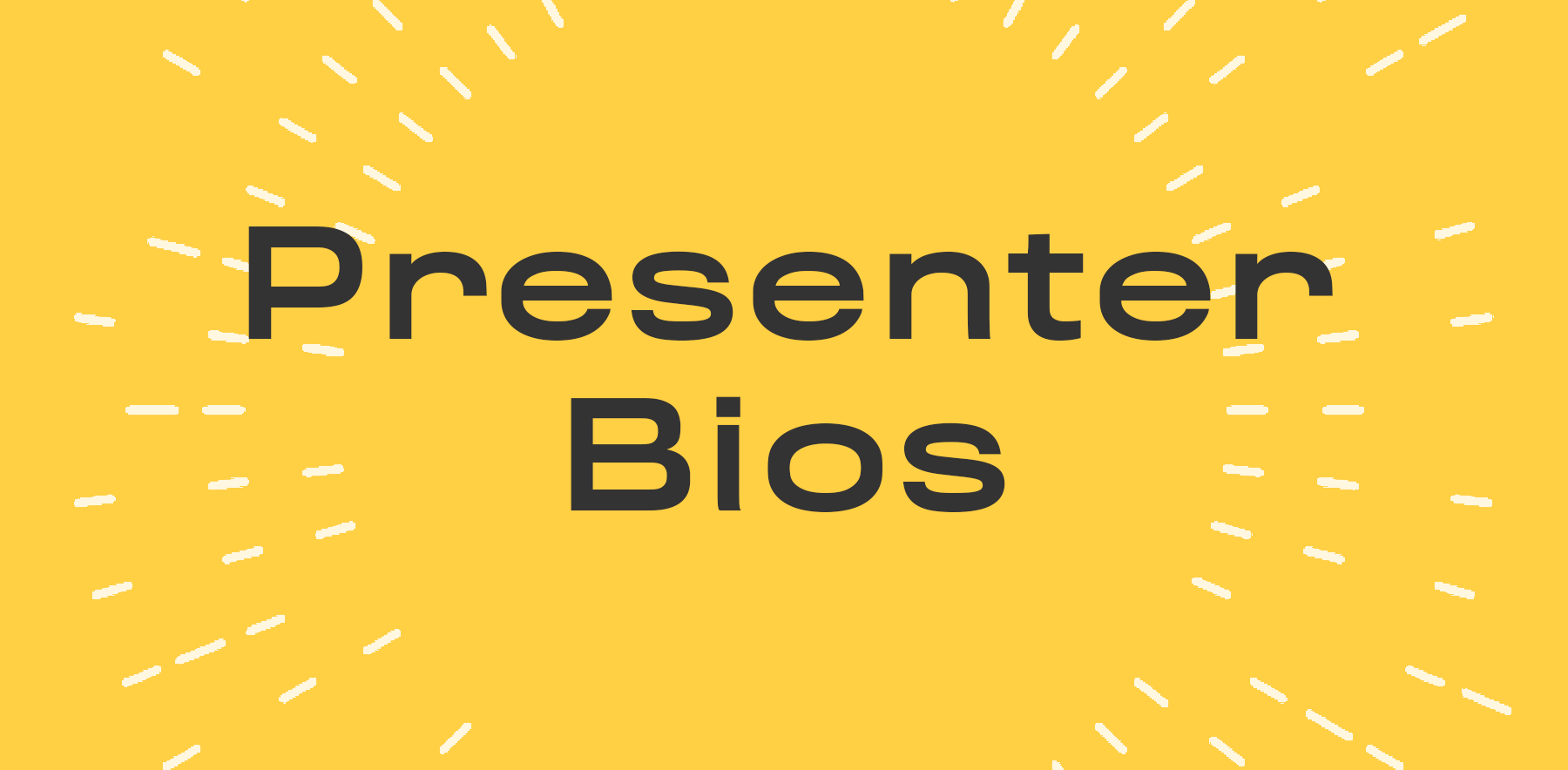Wednesday
Wednesday
4th Annual First-Generation Symposium
Adapting Amid Change and Uncertainty
Virtual Event
February 10-12, 2021
Wednesday Event Agenda & Session Options
1:15 - 1:45pm
Symposium Welcome
Join us for the launch of our 2021 annual First-Generation Symposium with Flying First co-founders Amy Ruymann, Director of University Advising Services, & Dr. Penny McPherson-Myers, Vice President of Diversity, Equity, and Inclusion. Also speaking will be first-generation student and Rowan University President, Dr. Ali Houshmand.
2:00 - 3:15pm
Panel Discussion
Interdisciplinary Research Panel: How Covid-19 Has Impacted Students Across the Country
Cassandra R. Davis, Ph.D.; Julie Sexton, Ph.D.; Harriet Hartman, Ph.D.; Mila Turner; Jalesa Sutton; and Terri R. Norton, Ph.D.
CONVERGE is a National Science Foundation-funded initiative headquartered at the Natural Hazards Center at the University of Colorado Boulder that advances social science and engineering, strengthening research networks between disciplinary communities. Sponsored by NSF's CONVERGE program, an interdisciplinary national team of researchers, from Rowan University, University of North Carolina at Chapel Hill, Florida Agricultural and Mechanical University, University of Colorado at Boulder, Bucknell University, and University of Pittsburgh, are studying the impact of COVID-19 on first-generation students. Panelists will discuss the diversity of disciplines involved in this project, first-generation students at each of their institutions, preliminary survey results and program objectives.
3:30 - 4:45pm
Please Bother Me!: Supporting First-Generation College Students Through Moments of Shame
Dana Kemery, Ed.D. and Dyron Corley, Ed.D.
Throughout the semester, first-generation college students may experience personal and academic difficulties prohibiting them from being successful. Often times, students will not avail themselves of the assistance offered by support staff and faculty thinking they may be a burden. By not seeking assistance to address their struggles, students can instead take on shame impacting their academic performance, self-esteem, and role development as a college student. Using case studies, participants will experience supporting a student through the shame recovery process. During this presentation participants will explore the concept of shame, discuss Van Vliet’s (2008) rebuilding approach, and apply tools to help individuals process and manage experiences that could lead to a shame response.
Also available 9:30am - 10:45am on Friday
3:30 - 4:45pm
Make College Work for You
Jonathan Harold, M.S. Counseling (Psy.D. Candidate)
Media influences mixed with messaging from family and friends have encouraged higher education for many students. Higher education on average will lead to a higher lifetime of income earned. Research suggests that many students especially first-generation students may not be utilizing college to its full advantage. With the multiple crises that have taken place in the last twenty years (pandemic, dot market crash, great recession, and occupy Wall Street), questions have lingered related to the true value vs. cost of education. Learn how to utilize the resources provided at college to set yourself up for the future that you desire.
3:30 - 4:45pm
First to Start, First to Finish: A Destination Without a Road-Map
Angie Diaz, M.A. and Viviana Zambrano, M.Ed.
Participants will gain insight as to why first-generation college students are resistant to seek support while navigating university systems for the first time. Attendees who are first-generation will achieve an understanding of how their cultural background impacts their decision-making when in need of assistance academically, professionally, and personally. The presentation will also address how generational trauma can contribute to the roadblocks for first-generation scholars to initiate outreach for aid in different aspects of their college career. Administrators will also obtain information on how to provide adequate support to this population that is not as forthcoming to request help when experiencing challenges in their daily lives. The presentation will provide research, case studies, interactive activities, helpful tips, and tools to navigate conversations with students about their academic and lifelong journey of being the first and maybe the only in their families to pursue an advanced degree. By the conclusion of the session, participants will be able to recognize the resources available on their campus. They will also recognize the hidden signs of how first-generation college students are impacted by trauma and their overzealous resilient attitude.
Also available 11:00am - 12:15pm on Friday
3:30 - 4:45pm
Adapting Through Uncertain Times: How S.E.L.F. (Safety Emotions Loss and Future) Impact First-Generation Students
Angelle E. Richardson, Ph.D., LPC and Stephanie Taboada
This workshop will explore how first-generation students who have experienced previous trauma may be adapting to the events of 2020, including the pandemic and racial injustice. Using the principles of Sandy Bloom’s Sanctuary Model, this workshop will discuss the impact of trauma on an individual’s perception of Safety, Emotion, Loss and Future (S.E.L.F.). This workshop with also discuss how intergenerational and historical trauma may further impact on how individuals operate within these four domains. Finally, this workshop will provide strategies for engaging with students.
Also available 3:30pm - 4:45pm on Thursday
3:30 - 4:45pm
Advocacy & YOU: How to Successfully Promote Support for Opportunity Programs in Higher Education
Danielle Jones
2020 has been a challenging year, which includes the COVID-19 pandemic, social unrest, political tensions, and an eventful presidential election. Advocacy, grassroots outreach, and community organizing have taken on a new dynamic, challenging an individual to utilize technology and innovative approaches for advocating to stakeholders in an online, remote environment. Complicated by a lack of civic education taught in elementary and secondary education, how confident are first-generation students in advocating for support for opportunity programs when enrolled in post-secondary education? Do first-generation students understand the power of their voice when advocating for opportunity programs, such as TRiO, Head Start, GEAR UP, and EOF? Similarly, are college/university faculty, staff, and professionals equipped to inform first-generation students and families about the history and importance of opportunity programs? Using Bronfenbrenner’s (1977) Ecological Systems Theory, this presentation aims to highlight the impact of systems in a first-generation student’s development and education. Subsequently, a first-generation student’s lack of exposure and interaction with their government can negatively impact their confidence in being an effective advocate for opportunity programs. At the end of this presentation, attendees will learn about the necessity of advocacy, plus how to interact with elected officials and stakeholders. Tools and resources will be provided on the legislative process in New Jersey. Furthermore, attendees will be empowered to incorporate civic engagement and advocacy initiatives in campus programming in support of opportunity programs.
Also available 11:00am - 12:15pm on Friday
5:00 - 6:15pm
Normal and Resilient... How Government Cheese and Music Can Change Your Life!
Kevin S. Koett, Ed.D.
The world is causing many to experience frustration, pain, uncertainty, and unrest. It is normal for individuals to feel as though they are the "only ones" with those feelings. This can be especially challenging for first-generation students as they navigate their college careers. This engaging session will utilize real-life experiences and humor to help participants develop the skills and tools needed to be confident, resilient, passionate, and prepared to overcome any obstacle they face in college or life.
Also available at 11:00am - 12:15pm on Friday
5:00 - 6:15pm
Bilingual First-Generation College Students Leverage Resources to Identify and Pursue Goals
Brooke Hoffman, Ph.D.; Beth Wassell, Ph.D.; Sandra Dominguez; and Arelis Alavarez
Drs. Brooke Hoffman and Beth Wassell coordinate Rowan University’s graduate and undergraduate ESL Certificate and Bilingual Endorsement programs. In these roles, they work closely with a number of first-generation students who are bilingual/multilingual with English as their second or additional language. Most of these students were classified as ESL students or participated in bilingual or dual-language programs as K-12 students. They are now pursuing careers in teaching, a field dominated by white, monolingual, English-speaking women, and leveraging their cultural and linguistic resources to pursue the ESL Certificate and/or Bilingual Endorsement. Drs. Hoffman and Wassell will facilitate a session in which these students share their personal narratives with a focus on the role of language in their journeys to access and persist in higher education. Prioritizing the voices of Rowan University’s own first-generation bilingual students, Drs. Hoffman and Wassell will reference relevant research.
Although research emphasizes the barriers these students face, our session will focus on the resources they possess and how they mobilize those resources to successfully access and complete college. As (future) educators themselves, these students have valuable insights for educators in PK-12 and higher education settings.
5:00 - 6:15pm
Building First-Generation Campus Advocates: Who, When, How?
Claude Taylor, M.A.; Bobbie Edgar, M.S.Ed.; and Liz O'Brien, M.S.Ed.
In this virtual roundtable session learn how three high touch point student-centered offices collaborate together to support first-generation students at Monmouth University. We will share best practices from our experiences for how to build partnerships and advocates across campus. Then we will participate in a breakout session to help support your current needs. The goal is for first-generation advocates to learn who you need to build relationships with and how to start that dialog.
Also available 9:30am - 10:45am on Friday
5:00 - 6:15pm
Stop Shrinking, Start RISING: First-Generation Strategies for Overcoming Imposter Syndrome & Owning Your Greatness!
Marisel Herrera
This is a power-packed workshop that is even more relevant during the current pandemic and period of unrest and uncertainty which is further causing first-generation, underrepresented students to question their ability to succeed and their belonging on college campuses. Imposter Syndrome is pervasive and destructive to all and must be addressed directly. This session will educate the audience on what it is, the factors that foster it (individual, societal and racially), and inform them on how profoundly it can impact them, and why we must overcome it and provide tangible tools to overcome it. It is a favorite among audiences including on national stages like the United States Hispanic Leadership Conference in 2020.
5:00 - 6:15pm
Career Pathways For First-Generation Students And Parents - Silver Linings In A Pandemic
Maud Fried-Goodnight, Ed.D.; Veronica Chainey, P.S.M.; and Iris Torres, M.S.
This presentation will emphasize projects which insured a successful transition during the pandemic to online services which included laptop and Hot Spot loan programs for low income students. RCSJ Cumberland received a Title V Las Vias grant in 2015, a Title III STEM Pathways grant in 2016 and a NSF Adelante Juntos grant in 2020. These programs enhanced Latinx student success to demonstrate increased Retention and Persistence, and college completion at remarkable rates. Based on the work of these programs, the institution was able to double its Latinx graduation rate within the past 5 years. Their work focuses on developing student persistence, resilience, and leadership for success. These programs collect and share rich data to inform decision making at the institution, and at with sister institutions at conferences. During this pandemic year the college has graduated Latinx students at the highest rates, and students have benefited from the strong, focused and strategic support provided by the Adelante Juntos, Title V Las Vias, and HSI STEM Pathways projects. In this presentation, project leaders will present key innovative interventions which have had the greatest impact on student success including: The Advising Syllabus, Summer Bridge Program, the Peer Mentor program, the Succeeding in College Math series, the use of Social Media to sustain, and enhance student engagement during a pandemic, the World Classroom, the successful transition to online services, online forms, Starfish Success Centers, Instagram Live, Las Vias Advisors Live and other Silver Lining Outcomes.
Also available 9:30am - 10:45am on Friday
5:00 - 6:15pm
Networking Opportunity
First-Generation Student Engagement Strategies
Provided by Rowan University
Come together with other professionals who support first-generation students to discuss and share best practices related to first-generation student engagement strategies.
7:00 - 8:30pm
Factors Influencing First-Generation Students' Ability to Obtain a Doctoral Degree in Clinical Psychology: An Intersectional Approach
Lauren Wallace, Ph.D. Candidate; Ebru Yucel, Ph.D. Candidate; Juliana D'Onofrio, Ph.D. Candidate; and Jim Haugh, Ph.D.
Although first-generation college students aspire to obtain graduate education, we know they are less likely to earn these advanced degrees compared to their non-first-generation counterparts (Engle & Tinto, 2008). There are several identified reasons for this discrepancy including differences in social identity from their families, financial barriers, and lack of social support (Gardner & Holley, 2011; King, 2017; Michalski et al., 2011). For example, it has been described how, "many of our families have difficulty understanding why anyone would go to school after finishing college" (Cook-Morales et al., 1995). The first half of this symposium will provide insight and discussion on previous literature relative to first-generation students aspiring to obtain doctoral degrees in clinical psychology. Next, presenters will transition to a panel discussion with attendees regarding their roads to successfully being admitted into a clinical psychology Ph.D. program. Our objective is to present students with various pathways to achieving this goal and how we overcame certain challenges as first-generation students while acknowledging intersectional factors at play.
Also available 2:00pm - 3:00pm on Friday
7:00 - 8:30pm
First-Generation Narratives: Why Do They Matter?
Cordelza D. Haynes, Ph.D. Candidate
This is an informative and interactive session to explore the power and meanings of First Generation voices. The premise and learning objective of this session is that there is no shame or weakness in being a First Generation student. Witness to personal power and agency, even in the midst of life circumstances, can be exemplified through narratives. We each carry and typify the evolution of those narratives. Beginning that process of naming those narratives is the means to own one's purpose and place in life. The format of this session is first lecturette, and then breaking into small groups to begin the process of writing and exploring one's narrative. We will then regroup to summarize our learning. Session limit 30.
Also available 2:00pm - 3:15pm on Thursday
7:00 - 8:30pm
Networking Opportunity
Engaging Campus Partners in Creating Support Programming for First-Generation Students
Provided by Rowan University
Come together with other professionals who develop first-generation programming to discuss and share best practices related to creating partnerships and bolstering administrative support for first-generation students across campus.
7:00 - 8:30pm
Proof in the Pandemic: A Tainted Experience for the First-Generation College Student
Diane Mussoline; Joan Pardo; and Tiffanie Williams
For many first-generation college students, the pandemic exacerbated many of the challenges and obstacles they continue to face and try to overcome— financial hardships, lack of college readiness, inadequate tools and family obligations. Although higher education has made strides in supporting first-generation college students throughout the years, the pandemic exposed the gaps of how we needed to improve our efforts to ensure the success of this population. There was an urgent need to develop intervention and preventative strategies to address pandemic related loss, mental health and increase student interest and engagement. The Educational Opportunity Fund (EOF) program at Rowan College of South Jersey, Gloucester Campus quickly transitioned from an on-campus pre-summer college program to creating a remote pre-summer college program for qualifying EOF students. The aim of the remote pre-summer college program was to build a virtual community for incoming EOF students that focused on transitioning graduating students from high school to college in a time where their world felt upended due to coronavirus. The success of the summer program proved that with early intervention, preventative strategies, and collaboration efforts we could help first-generation college students adapt to altered college expectations in order to succeed.
Also available 11:00am - 12:15pm on Friday.
7:00 - 7:45pm
Keep Your Eye on the Prize
Mary Ellen Santucci, Ph.D., RN
This presentation will reflect on my life story and offer support and hope to first-generation students. It will detail how my journey starts as a single mom with an 18 month old and no job prospects to the Chair of the Department of Nursing at Rowan University with the 18 month old now a successful attorney. The presentation will allow individuals to plan and envision their future and the determination to achieve.
Also available 2:00pm - 2:45pm on Thursday
7:00 - 8:30pm
Networking Opportunity
First-Generation Alumni and Faculty Engagement
Provided by Rowan University
Come together with other professionals who develop first-generation programming to discuss and share best practices related to engaging first-generation alumni and faculty.










